theartsdesk in Fes: The Festival and the Moroccan Spring | reviews, news & interviews
theartsdesk in Fes: The Festival and the Moroccan Spring
theartsdesk in Fes: The Festival and the Moroccan Spring
Youssou and Iraq's biggest heartthrob perform at the best world music festival
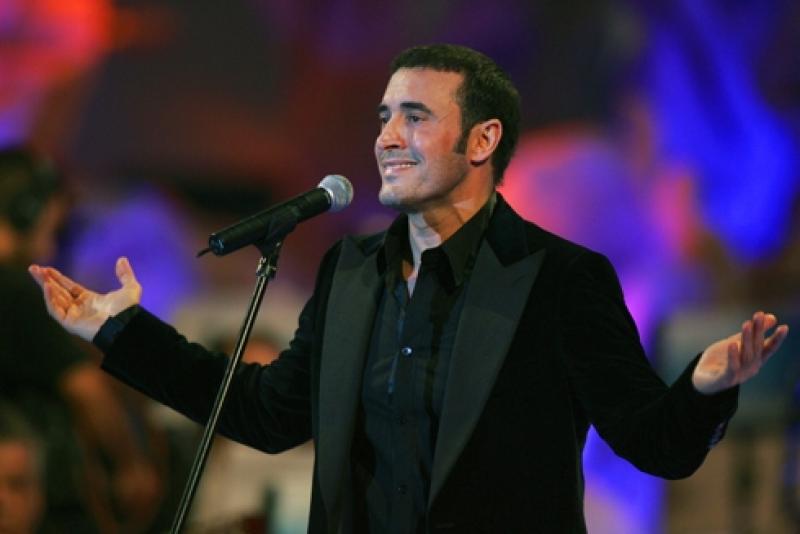
Strange portents – the weather is always dry and baking hot this time of year in Fes. This time it was like winter, with lashing rain and thunder for the first few days of the Fes Festival. But then things are strange in general here; events are moving fast throughout the Maghreb. The first day I was there saw a demonstration of thousands in Rabat, and a smaller one in Fes. By the last day a new constitution had been posted online, with the King renouncing some of his powers.
Fes was always a fascinating city, but just as Morocco itself is at a central point between the Maghreb, sub-Saharan Africa and Europe, Fes itself is the centre and heart of Morocco, one of the three great spiritual cities of Islam, with a university started three centuries before Oxford, by a woman. So is it really changing? The Festival of World Sacred Music, to give it its full title, is now in its 17th year, and was set up initially as a response to the first Gulf War. The idea of music being performed by musicians of different faiths in an Islamic country was a powerful one as a symbol of tolerance, and even more so since 9/11.
A strong part of the festival is the Fes Forum, a colloquium which tended to be rather nebulous and well-meaning for more pragmatic Anglo-Saxon tastes but still valuable (one of the main benefits is the connections made in the down time). This time it was dealing with some grittier matters like corruption and the Arab Spring. Nothing overly controversial was said – but at least such subjects were being discussed. At the Forum I met two members of Transparency Morocco – an anti-corruption outfit still taking baby steps, raising awareness of the issue and lobbying for the rights of whistle-blowers. No bad guys have been arrested yet. But at least it is a start.
There was a general sense of opening. I was told you risked arrest a few years back for wearing a T-shirt I wore from a film festival in the refugee camps (or “hostage” camps if you take the official Moroccan line). Tindouf in southern Algeria is run by the Polisario Front who have been in conflict with Morocco for 30-odd years; 200,000 people live in its camps. At least two people, including one I'd known for years, said that they had been in prison for political reasons, something not mentioned before. Why risk any aggravation? Delegates like Youssou N'Dour and Katherine Marshall, a professor of Georgetown University and long-term supporter of the festival, spoke out on TV (see video of Al-Arabia TV below) with cautious appoval of the unfolding situation.
Watch a clip about the Fes Festival from Al-Arabia TV
Fes still is a religious powerhouse with the city the centre of some of the biggest Sufi brotherhoods in the world – such as Tijani who have millions of followers in many countries. I met Ibrahim Tijani, the grandson of the Sheikh (the leader of the Tijanis), who runs the internet part of the operation. He’s one of the super-bright Moroccans who are likely to end up in leadership positions as Morocco pivots into the future. Ibrahim, like most Moroccans, feels that the country is more united than others in the region despite the mix of Arab, Berber, Sarahawi and other peoples who have histories of conflict, and while “birth and death can be violent”, they all hope Morocco will have a relatively painless transition.
The King is a revered figure by the majority as a unifying force, and Tijani and others estimate the hard-core Islamist element to be less than 20 per cent. “Evolution not revolution”, as Mohammed Kabbaj put it; he is the former mayor of Casablanca, adviser to the King and one of the powers behind the festival - the others being music director Alain Weber and Faouzi Skali whose idea the festival was initially and who is now back at the helm after a few years running his own rival Sufi festival in Fes.
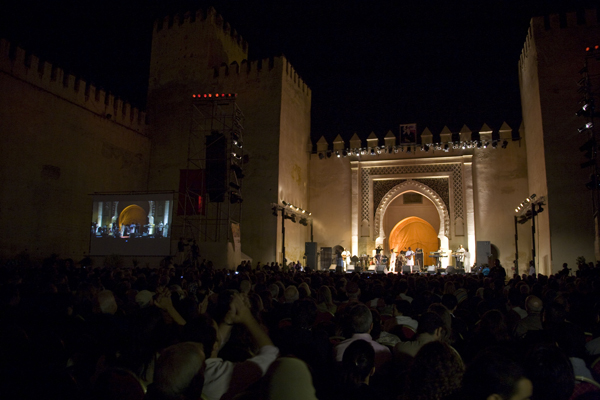
Youssou N’Dour is one of the followers of the Tijani, who are particularly popular in his native Senegal. When the programme describes him as “a veritable icon of west African music”, they do not exaggerate. Now 51, Youssou’s music is fabulously grown-up and mature these days rather than the eternal adolescence of most long-established rock bands. (Pictured right, Youssou N'Dour performs at Bab Makina. Photo by Omar Chennafi.) Youssou does rock, but also takes us on a journey as a kind of musical magus. I’ve never heard him and his band, the Super Etoiles de Dakar, in such yearning, bluesy form. The trip takes us from despair to joy, lifted up by his impeccable musicians and, if things got a bit slow, some amazing acrobatics (although not from Youssou who is a bit long in the tooth for somersaults). He also did a couple of numbers from his more spiritual album Egypt, an innovative and beautiful recording he debuted here in Fes with an Egyptian orchestra in 2004 – one of the most memorable concerts of the last decade. Youssou’s voice remains, as I called it the last time he was in London, one of the seven wonders of the world.
Watch Abd Al Malik perform at the Fes Festival
One of the great things about Fes is the showcasing of stars in other parts of the world that are not known much in the Anglo-Saxon world - such as Abd Al Malik (see video above), a “rappeur, slammeur and compositeur” who lived in Brazzaville, Congo and who is now a big figure in France. Unlike most rappers, he surrounds himself with a great band of jazzy musicians and his lyrics reflect the fact that he is a follower of the Boutchichiyya, an important Sufi group, also with millions of followers with its HQ in the east of Morocco – in other words, no songs about guns and bitches.
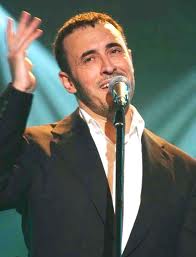 The biggest star of the week, though, was Kadem Al-Sahir (pictured left), an Iraqi heart-throb who had scalpers wanting large amounts of dirhams for tickets. Le tout Fes turned up in their finery, men in suits and women glammed up in dresses and high-heels. With a swooning orchestra under the moon outside the gates of the King’s Palace at the Bab Makina (and an old weapons armoury on the other side), he thrilled the crowd. He told me that he would sprinkle his set with a few spiritual numbers as he was in Fes, which he did, but the fans wanted to hear songs like "The School of Love".
The biggest star of the week, though, was Kadem Al-Sahir (pictured left), an Iraqi heart-throb who had scalpers wanting large amounts of dirhams for tickets. Le tout Fes turned up in their finery, men in suits and women glammed up in dresses and high-heels. With a swooning orchestra under the moon outside the gates of the King’s Palace at the Bab Makina (and an old weapons armoury on the other side), he thrilled the crowd. He told me that he would sprinkle his set with a few spiritual numbers as he was in Fes, which he did, but the fans wanted to hear songs like "The School of Love".
I first met Al-Sahir in Morocco a few years back, during the height of the Iraq war when he was filming a video for a new song called “The Older You Are, the More Beautiful You Become” - a message happily received by his female fans of a certain age. Al-Sahir, now 53, says women definitely find him more attractive as he ages. Weeks before the Iraq war broke out, he made the bold move of touring the United States. Was that really the best time? "Yes, it was perfect. Because it was necessary to portray another face of Iraq. Of beauty and poetry rather than of war." The song of his that regularly brought the house down was “Beauty and His Love”, dedicated to the city of Baghdad: "The city is like a beautiful girl," he explains. "Even when I am unfaithful, living in other cities, she is the one I dream of. A city of singers, artists and philosophers."
Born in northern Iraq, Al-Sahir dismayed his parents when at the age of 12 he sold his bicycle and bought a guitar, saying he wanted to pursue the precarious career of a musician. He studied hard and was accepted for the prestigious Baghdad Music Academy after being in a rock band: "I had long hair and listened to The Beatles as well as Arabic music and composers like Beethoven." Drafted into the army at 21, he remained in Baghdad, although his best friend and many others he knew perished in the war with Iran.
It wasn't long before he was running into trouble with the authorities, who asked him to change the lyrics of a song called “Snake Bite”, read by many Iraqis as a criticism of the Iran war. Another, which had a video of 4,000 people chanting, "We are living in a house of hell", was also censored. When he got calls to appear on programmes boosting Saddam and the regime, he could not refuse. "There was no choice. I was frightened. But I always wanted to be free and independent." He defected after a concert tour in 1992, and now has houses in Paris and Cairo, but still returned for occasional concerts in Iraq until 1997. Would he like to go back and play or record there now? "There is nowhere to play and the best musicians are still abroad. But I will come back and play and bring in equipment from abroad. My hope is that Iraq will recover to how it used to be, a centre of culture."
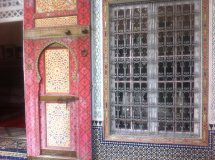
He undid his shirt and showed me a lyric tattooed on his chest. It was his song “The School of Love”, written in the Gulf War of 1991. "I placed this song and some others in one room and slept in another, so that if a bomb came, only one of us would go and I put a note with the song saying, 'Please give this to someone who knows about music.'" Like others I met in Fes this time, for the first time in decades, they have some tempered optimism about the future of the region.
Generally, although, for musical enlightenment the biggest treasures were smaller events like the showing of Franz Osten’s extraordinary classic silent movie from 1929, The Light of Asia, about the life of the Buddha, accompanied by a wonderful group of Muslim and Hindi musicians from Rajasthan.
Extract from The Light of Asia (with less interesting music)
The ensemble Paraguay Barroco d’Ascunción mixed Baroque music and traditional polkas and guaranis to sweet effect. Their Vivaldi attempt was a bit out of tune for European ears, but the mix of more traditional songs was utterly charming. A group of Sufis called Syubbanul Akhyar from Java gave an Indonesian flavour of flutes and strings in the delightful surroundings of the Musée Batha and sung a hugely memorable, heart-melting song to the Prophet which I kept remembering for days afterwards. Most of the audience seemed to be dancing under the famous giant Barbary oak with joy when they encored that one.
The festival has free concerts for those not able to afford the prices in Bab Makina, especially in the open square of Bab Boujloud, impressive for the thousands of swirling swallows at sundown. I saw a terrific group of massed Aissawas, one of the more musical brotherhoods,(pictured, below) whose music is known to have healing effects, causing people regularly to go into trance. The audience of thousands started pogoing, especially when the big n’far horns were deployed. Making an unearthly noise, they are used for waking people up – literally and metaphorically, an alarm call from Allah.
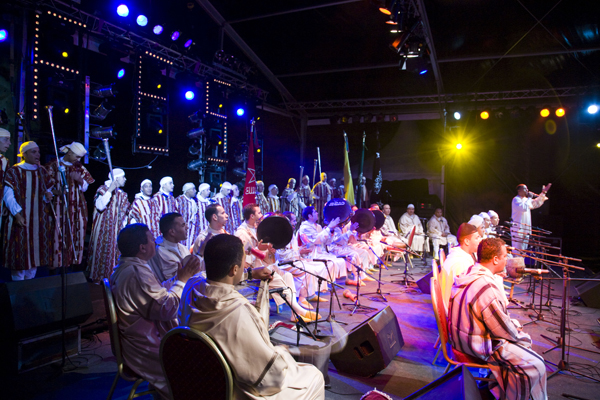 The Sufi nights at Dar Tazi in the medina at 11pm remain essential - the highlight this year being the unexpected appearance of Fareed Ayyaz and Party, one of the top Qawalli groups from Pakistan (a style made popular in the West by Nusrat Fateh Ali Khan).
The Sufi nights at Dar Tazi in the medina at 11pm remain essential - the highlight this year being the unexpected appearance of Fareed Ayyaz and Party, one of the top Qawalli groups from Pakistan (a style made popular in the West by Nusrat Fateh Ali Khan).
Part of the experience of such a festival is to meet the kind of people you don’t normally run into - such as a woman from a village in Niger called Salamatu who made an impact at the Fes Forum, a democracy activist planning a festival in Niger next year (theartsdesk absolutely intends to attend). She was rather saintly, but with a penchant for gold braid; I nicknamed her “Saint Bling-Bling”. She outraged some feminists by speaking in favour of polygamy. “The worst position to be is the second wife of three,” she told me. (She is the first wife of two.) I also met an Iranian psychoanalyst living in Paris, who told me she was kept awake by her neighbour noisily making love to different women each night – then she spotted said neighbour at the festival, who came up and asked if they knew each other from somewhere.
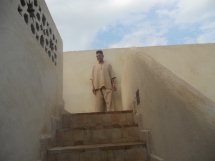
There’s also a magical underground in Fes, as in the rest of Morocco. One night a Moroccan kept me up late with stories which sounded as though they came from One Thousand and One Nights. An educated, modern guy living in Casablanca, he said he had no time for the old superstitions. Then his uncle began displaying strange symptoms: his eyes were staring and he spoke in a different voice. Being modern, they thought he had some neurological illness. But then he began to say he was possessed by a genie (or d'jinn as they say in these parts) that was able to live in two humans and that his story would be proved if he went to Larache, on the coast. His son decided to go. Walking along the quayside a legless sailor beckoned to him and said, “I am the genie who is also living in your father.”
What Fes has is a striking balance of the ancient and the modern. The Medina, where the so-called New Town dates from the 13th century, doesn’t give up its secrets easily. It's next to the French colonial Ville Nouvelle. (Ben Harper, who headlined the last night on Sunday with his gospel-tinged music, said that he was embarrassed to admit that this was his first visit to Africa and after a 10km walk in the Medina his life would never be the same again). Faouzi Skali talks of "the nostalgia of Andalusia" in Fes, a more or less accurate image of a golden age where Islam was at the forefront of science and where different faiths lived more or less harmoniously. When the Muslims and Jews were ejected many came to Fes. The hope is for a 21st-century Andalusia, for a birth that is not violent, for a transformation into a modern society, with more democracy and less corruption, but keeping the best of the ancient culture and not as materialist as the West. There remain huge problems, notably the level of youth unemployment, but there is that precious commodity of hope. There’s no doubt that the Fes Festival, as well as being the most consistently high-quality world music festival anywhere, has had a role in opening things up.
Share this article
Add comment
The future of Arts Journalism
You can stop theartsdesk.com closing!
We urgently need financing to survive. Our fundraising drive has thus far raised £49,000 but we need to reach £100,000 or we will be forced to close. Please contribute here: https://gofund.me/c3f6033d
And if you can forward this information to anyone who might assist, we’d be grateful.

Subscribe to theartsdesk.com
Thank you for continuing to read our work on theartsdesk.com. For unlimited access to every article in its entirety, including our archive of more than 15,000 pieces, we're asking for £5 per month or £40 per year. We feel it's a very good deal, and hope you do too.
To take a subscription now simply click here.
And if you're looking for that extra gift for a friend or family member, why not treat them to a theartsdesk.com gift subscription?
more New music
 Moroccan Gnawa comes to Manhattan with 'Saha Gnawa'
Trance and tradition meet Afrofuturism in Manhattan
Moroccan Gnawa comes to Manhattan with 'Saha Gnawa'
Trance and tradition meet Afrofuturism in Manhattan
 Soulwax’s 'All Systems Are Lying' lays down some tasty yet gritty electro-pop
Belgian dancefloor veterans return to the fray with a dark, pop-orientated sound
Soulwax’s 'All Systems Are Lying' lays down some tasty yet gritty electro-pop
Belgian dancefloor veterans return to the fray with a dark, pop-orientated sound
 Music Reissues Weekly: Marc and the Mambas - Three Black Nights Of Little Black Bites
When Marc Almond took time out from Soft Cell
Music Reissues Weekly: Marc and the Mambas - Three Black Nights Of Little Black Bites
When Marc Almond took time out from Soft Cell
 Album: Mobb Deep - Infinite
A solid tribute to a legendary history
Album: Mobb Deep - Infinite
A solid tribute to a legendary history
 Album: Boz Scaggs - Detour
Smooth and soulful standards from an old pro
Album: Boz Scaggs - Detour
Smooth and soulful standards from an old pro
 Emily A. Sprague realises a Japanese dream on 'Cloud Time'
A set of live improvisations that drift in and out of real beauty
Emily A. Sprague realises a Japanese dream on 'Cloud Time'
A set of live improvisations that drift in and out of real beauty
 Trio Da Kali, Milton Court review - Mali masters make the ancient new
Three supreme musicians from Bamako in transcendent mood
Trio Da Kali, Milton Court review - Mali masters make the ancient new
Three supreme musicians from Bamako in transcendent mood
 Hollie Cook's 'Shy Girl' isn't heavyweight but has a summery reggae lilt
Tropical-tinted downtempo pop that's likeable if uneventful
Hollie Cook's 'Shy Girl' isn't heavyweight but has a summery reggae lilt
Tropical-tinted downtempo pop that's likeable if uneventful
 Pop Will Eat Itself's 'Delete Everything' is noisy but patchy
Despite unlovely production, the Eighties/Nineties unit retain rowdy ebullience
Pop Will Eat Itself's 'Delete Everything' is noisy but patchy
Despite unlovely production, the Eighties/Nineties unit retain rowdy ebullience
 Music Reissues Weekly: The Earlies - These Were The Earlies
Lancashire and Texas unite to fashion a 2004 landmark of modern psychedelia
Music Reissues Weekly: The Earlies - These Were The Earlies
Lancashire and Texas unite to fashion a 2004 landmark of modern psychedelia
 Odd times and clunking lines in 'The Life of a Showgirl' for Taylor Swift
A record this weird should be more interesting, surely
Odd times and clunking lines in 'The Life of a Showgirl' for Taylor Swift
A record this weird should be more interesting, surely

Comments
...